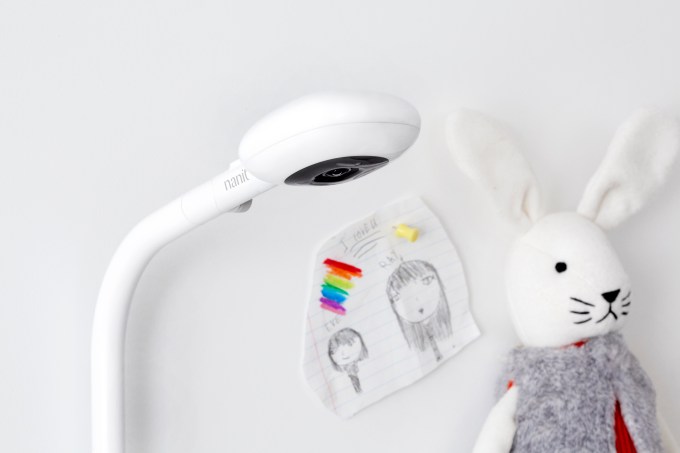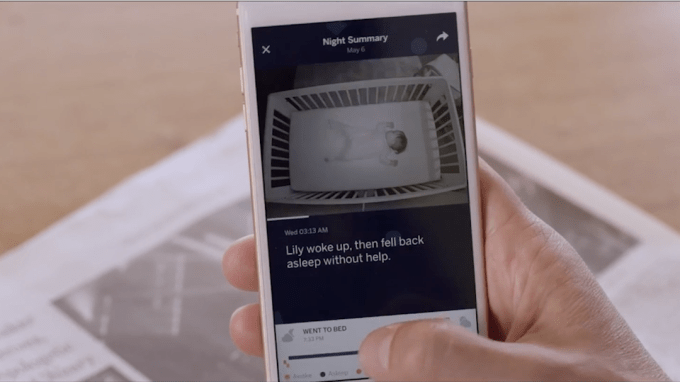[tc_aol_on code=”519623011″]
What if a simple camera capturing data for machine learning could tell you the threat level of an individual approaching a fence? What if the same combination of camera and computer could classify the behavior of shoppers in a grocery store isle and judge things like intent to purchase, presence of decision paralysis, and ease of identifying desired products? Fueled by advances in image recognition and processing power, smart-cameras that can classify human behavior rather than simply observe it may be the next step for IoT.
Nanit is one of the first companies in this space. Dr. Assaf Glazer, a parent himself, and his team are working to take the pain out of one of the most strenuous tasks of any parent, making sure their baby gets a good night’s sleep.

The three-ounce camera is attached to a 10.5-pound base that suspends the camera over a crib. Highly technical startups with connections to academia can often struggle to identify a market niche and demystify their technology to everyday consumers. Glazer went through over 200 designs to ensure his product would be different. Sleep deprived parents don’t have to worry about charging the device or replacing batteries. They simply plug the low voltage device into the wall.
The Nanit app, with optional insights, provides an intuitive breakdown of infant sleeping patterns, including a heat-map of infant movement. Unfortunately, without a subscription, parents will only be able to use Nanit for live-streaming video from a crib. Nanit Insights generate a cute color coded sleep score for parents using four key metrics: sleep patterns, parent interventions, sleep onset, and total hours of sleep.
From a computer science perspective, Nanit is touting a rather impressive consumer application of machine learning. The number of variables in most spaces would make behavioral analysis nearly impossible. Fortunately for the Nanit team, almost all crib mattresses are the same size. This allows for the camera’s parameters to be standardized so that the computer can break up the space into small bits that can be accurately analyzed.

When parents first unbox their Nanit baby monitor, there is a simple calibration process. Once the parent goes through this process and places the camera on the stand, they shouldn’t have to go back and adjust the system again.
In addition, Nanit also includes a convenient night light, white noise maker, nature sound generator, and a cable management system. Beyond sleep, the baby monitor can also track humidity, temperature, sound, and motion.
Nanit’s backers include Mark Suster leading from Upfront Ventures, as well as participation from RRE, 645 Ventures, Jacobs Technion-Cornell Institute, Flex, and Jerry Yang’s AME Cloud Ventures. To date, the company has raised $6.6 million in seed funding.
The smart baby monitor space continues to be very active. Companies like Owlet, Mimo and Sproutling produce infant wearables but are constrained by components and sensors. Many parents are not comfortable letting their infants wear what amounts to an Apple Watch embedded in their clothing. Devices like Dropcam don’t classify behavior. They are limited to capturing live footage and generating a pixel representation on another device. Nanit’s baby monitor is extra powerful because it is possible to add new analytic features to the device without adding physical sensors. Glazer’s goal is to continue to improve insights and work to personalize parenting recommendations powered by data.

While it’s easy for someone with an interest in behavioral science to find Nanit’s baby monitor exciting, its critical to question the ability of the device to not only inform parents but influence behavior.
One early idea for how Nanit might influence best practices is rooted in its ability to detect a child’s ability to return to sleep after awakening. This knowledge can prevent parents from rushing to an infant’s side when they don’t need it and only further waking their child.
Nanit will be available for pre-order via direct sale e-commerce starting today. The company plans to manufacture the first 15,000 devices in the United States to reduce the time it will take to get the product in parents’ hands. Afterwards, the company plans to move production offshore.
The pre-order price is $279 with an optional $50 subscription to Nanit Insights. After the pre-order period, the monitor will retail for $349 and the subscription price will increase to $100. Parents will have 30 days to decide whether to continue their yearly subscription.






























Comment